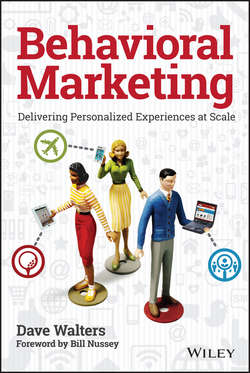Читать книгу Behavioral Marketing - Nussey Bill - Страница 5
На сайте Литреса книга снята с продажи.
THE BEHAVIORAL MARKETING MANIFESTO
ОглавлениеWhen we talk about how industries change and when new thinking emerges, the concept of a manifesto is one that surfaces often. Whether you're a fan of religious figures like Martin Luther and his 95 theses or your thinking leans more toward the business world's Cluetrain Manifesto, outlining a core set of truths can be a powerful way to set the frame of reference for the next phase of the conversation.
Given that this is the first deep-dive book on behavioral marketing, I thought it'd be valuable to outline 50 of the top-line theories in a quick format that sets the concepts for the rest of the chapters. I've broken the manifesto into 10 key sections ranging from marketing to team to revenue. Think of these as guiding principles, and we'll dive into each of them in much more detail throughout the book. And yes, they're tailor-made for social sharing, should the urge strike you.
Marketing
1. Almost every sale begins with marketing. Get it right, then scale.
2. Marketing is your best chance to frame the buying decision in your favor. Start early.
3. Marketing without a point of view is time and money wasted.
4. There's a human on the other end of every marketing experience. Recognize that.
5. Understand the difference between the science and art of marketing. Be better at both.
Sales
6. A marketer's best friend is a well-informed sales rep.
7. Expect CRM drama between sales and marketing. Solve it with more qualified leads.
8. Sales complains about logging activity, until they close six more deals a month.
9. Sales is comp-driven first, but don't underestimate the roles of team and mission.
10. Done well, great sales informs better marketing – and vice versa.
Customer
11. Your customers will solve their business problems – with or without you.
12. Cherish your existing customer base and build raving fans from day one.
13. Your goal: remain so critical your customers don't even accept competitor calls.
14. Build a core competency in customer listening – and do it closest to your most progressive executive.
15. Your customer's skill set is a broad spectrum: some are at ground zero, some are improving fast, some could teach you.
Prospect
16. Educating prospects is marketing's most important job. Always and forever.
17. If you don't positively articulate your value proposition, your competitors will stack the deck against you.
18. Winning content strategy is built on value exchange. You provide insight, they share data and let you keep competing.
19. Understand the lead source, content-consumption preferences, and behaviors of your best prospects and double down.
20. Choose the best three social destinations for your prospects and engage like your business life depends on it. It does.
Data
21. Data driven is nice, but conversion driven is better.
22. Care more about what your audiences do than what they say.
23. It's marketing's job to figure out how to make sense of all that data. Start now and work it hard.
24. All the data in the world won't gloss over bad customer experience or poor campaign execution.
25. Customer data is like human knowledge – build it from diverse sources over a lifetime with specific goals in mind.
Behaviors
26. One “buy now” button click is worth 100 email opens.
27. Buyer intent is captured in actions, not in words. Sales and marketing should both understand this reality.
28. Behaviors are a marketer's treasure map, defining the path to conversion moments.
29. A great scoring model includes behaviors, demographics, sentiment, and complete objectivity.
30. Factoring your customer experiences for behavior transforms marketing effort into revenue.
Team
31. Hire for potential, and be prepared to mentor your staff to greatness.
32. Build a team and culture that incents and celebrates new-hire referrals from existing employees.
33. Require your marketers to work directly with sales management on program development and reporting.
34. Hire an expert on your marketing platform of choice. Their deep skill enables your success.
35. Develop a strong competency around hiring brilliant 25-year-olds. They're tomorrow's directors and VPs in training.
Company
36. It's your job to educate your executives on marketing. Ignore this at your own peril.
37. Your company has a story. Discover it and anchor your marketing on its principles.
38. No one cares about the constraints you work under. Give 120 percent to every customer experience you tackle.
39. Authenticity and trust are the basis of every great customer relationship.
40. Look beyond your industry for winning marketing tactics. Different is better.
Vendors
41. Trust but verify in the demo phase. Evaluate on end-to-end solutions, not slide ware.
42. Outsource when necessary, but develop your own policies and processes to drive execution.
43. Use agencies to scale your most successful marketing programs while challenging them to develop big ideas.
44. Clearly understand and enforce how your vendors work together to make your marketing better.
45. Cheaper isn't always better. Hire the best thinking your budget can buy, and track ROI like a beast.
Revenue
46. Revenue lift cures almost all ills.
47. If you're ignoring behaviors today, you're missing a huge chunk of income – especially in ecommerce.
48. Every marketing interaction costs money. Being brutally efficient on cost drives top-line revenue.
49. Great marketing makes your customer want to give you money. Don't get in the way.
50. Email open, customer satisfaction, and hold-time key performance indicators (KPIs) are important. Revenue trumps them all.
